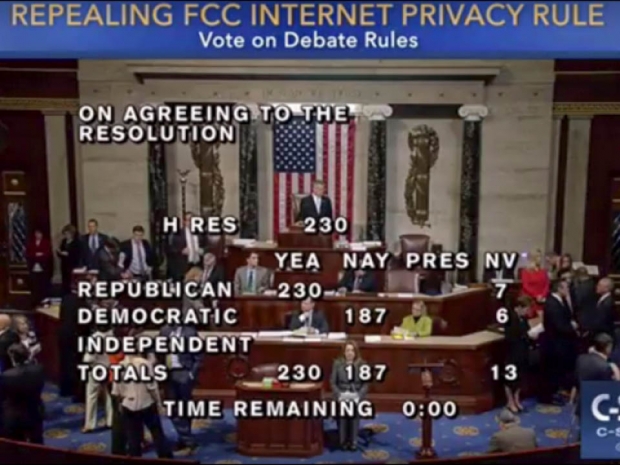After the House voted Tuesday to overturn the previous FCC administration’s Internet privacy protections that prevented the sale of web browsing traffic data to third party advertisers, Actor Misha Collins from the TV show Supernatural and Adam McElhaney from Tennessee have raised a combined $253,000 to purchase Congressional browsing history data. After raising more than $75,000 on his GoFundMe page, Misha wrote on Twitter, “Thanks, Congress, for voting to put all of our private data up for sale! We can’t wait to buy yours”.
Adam, on the other hand, wrote very distinctively, “It is my ultimate hope that we will be able to use the donations to restore our right to privacy” after having raised more than $178,000 from over 11,400 people on his own GoFundMe page.
Among the changes in Senate Joint Resolution SJR34 (passed in House 215-205) is legislation that would make it easier for Internet Service Providers to gather and sell personal information including Web browsing history and frequently visited sites to the highest bidder, including marketing companies and law enforcement agencies. The bill is now pending approval by President Trump.
The goal of both crowdfunding campaigns was to turn the tables on Congress and allow their private browsing histories to become public information. The movement has received a fair share of support from other pledgers, including Max Temkin, a designer of the popular Cards Against Humanity game. Temkin said prior to the House vote that if it passed, “I will buy the browser history of every congressman and congressional aide and publish it”.
Following the vote, however, he mildly changed course and promised to match up to $10,000 in donations to the Electronic Frontier Foundation (EFF), one of the premier advocacy hubs of consumer Internet privacy protections.
“If this data becomes available, Cards [Against Humanity] remains committed to buying it,” Melissa Harris, a spokeswoman for the company, told the Washington Post. “Obstacles, however, remain. First among them: the President’s signature on the bill. Then, legal challenges are likely to follow.”
Legal challenges: ISP privacy policies and state attorney general lawsuits
The card company says that if legal challenges to the fundraising efforts should fail, it will pursue the browsing histories to the best of its abilities.
Traditionally, most ISPs in the US have privacy protections against the sale of an individual’s personal information, not to mention several guarantees under the Fourth Amendment. According to Travis LeBlanc, former enforcement bureau chief at the FCC, if an ISP were to sell a customer’s personal data, it would result in a potential court case with the company by a state attorney general.
Of course, the idea is to get someone with legal experience to point out the necessary contradictions between allowing third-party advertisement groups full and unrestrained access to consumer Web data, while prohibiting its sale to individuals outside a service provider’s partnership agreements. The other option would be to negotiate directly with the third-party agency that has obtained a Congressional representative’s information, but this method of obtaining data for each member of Congress would likely end up very fragmented with limited ability to retrieve each respective seat in both upper and lower chambers at once.




